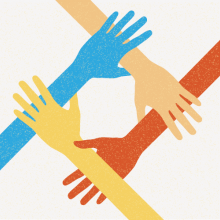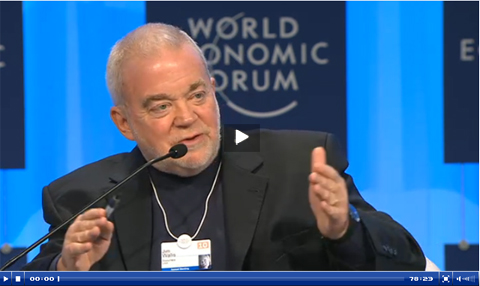world economic forum
THE IMAGE THAT first brought Ugandan climate activist Vanessa Nakate to many people’s attention is one that doesn’t even include her.
In January 2020, Nakate was invited to join five other young activists in a climate demonstration during the World Economic Forum annual meeting in Davos, Switzerland. An Associated Press photographer snapped a photo of Nakate standing with European climate activists Luisa Neubauer, Greta Thunberg, Isabelle Axelsson, and Loukina Tille. But when the AP published the photo that afternoon, Nakate wasn’t in it.
“Even now, well over a year after being cropped out of that photograph, it’s hard for me to talk about what happened,” wrote Nakate in her 2021 book A Bigger Picture: My Fight to Bring a New African Voice to the Climate Crisis. “By cutting me out of the photo they’d originally sent to global media organizations, the AP had denied an African activist a chance to be seen and, possibly, her message to be acknowledged.”
While the AP did some “soul-searching” following the incident, Nakate used the moment to ignite an overdue conversation about the whiteness that has long plagued the global environmental justice movement. “Being cropped out of the photo changed me,” she wrote. “I decided, from my perspective as a young African woman, that I would dedicate as much of my time as possible to addressing the many interlocking facets of the climate crisis, environmental justice, and gender discrimination — and to do so without apology or fear of erasure.”
Nakate founded the Rise Up Movement to amplify the voices of climate activists from Africa and launched a fundraising campaign for the Vash Green Schools Project to bring solar panels and cookstoves to schools across Uganda. At 25, she’s busy. And faced with a global climate emergency, it makes sense. “I don’t often get asked what recharges me,” Nakate told me when we spoke in early August. “But for me, it’s my relationship with the Holy Spirit.”
Raised in an Anglican family, Nakate became a born-again Christian as a teenager. “Activism can be very hard and prayer and attending services (or, in Covid times, watching online) have been extremely important sources of love, grace, and support,” she wrote in the acknowledgments of A Bigger Picture.
“If I feel distraught or disturbed by anything, I know the Holy Spirit will remind me of the peace that surpasses all human understanding,” she later told me. I spoke with Nakate via Zoom about her Christian faith, the role social media plays in her activism, and why we can’t eradicate poverty without addressing the climate crisis. — Christina Colón
We are only two months into 2015 and it has already proven to be a busy year. There is much to be hopeful for in this coming year and much work still to be done on changing the hearts and minds of those in positions of leadership. We are so thankful for our community of supporters who invest and encourage our mission and ministry!
I just returned from Davos, Switzerland, where the annual meeting of the World Economic Forum is held each year. Leaders from business, government, and civil society all gather here to engage each other, make connections, and, hopefully, make progress on the mission statement of the WEF: “Committed to Improving the State of the World.”
I reflected on that mission statement last year in my remarks to all the attendees at the event’s closing session. I said the deeper meaning of leadership is sacrifice and not just skills — and that the most included people on the planet who were sitting in that famous Congress Hall will be morally evaluated by their relationship to the most excluded, who, of course, are never in that grand auditorium. Many individual leaders in attendance wanted to discuss that challenge further, and those conversations continued this year.
One session this year that drew many people off site was called “Struggle for Survival” — an intense simulation of how 3 billion people in our world actually live each day. Half of the global population exists on less than $2 per day. Run by the Crossroads Foundation, Struggle for Survival was a much more emotional experience than the rest of the sessions at Davos.
My wife, Joy, and I participated in this simulation, and the people running it told us that several CEOs seemed quite affected by the very powerful dramatization of real-world injustice and poverty. It took people out of their heads into stunning revelations of how the excluded really live, prompting feelings of guilt, pain, anger, empathy, and compassion — and then a call to commitment.
This week, there was a lot of commentary about the State of the Union, the title of the president’s annual January speech before a joint session of Congress. I thought it was one of Obama’s best addresses recently because he focused on what is real for this country — growing economic inequality where only a few are doing “spectacularly well” while many families are still struggling just to get by.
The wife and mother from one of those families wrote the president a letter that seemed to have moved him, so he lifted up her “tight-knit family” trying to get through “hard times,” as she sat up in the gallery next to first lady Michelle Obama. Her family became a parable for the nation that is starting to do better economically but still faces hard choices that the president sought to address with very practical suggestions to support what he called “middle class economics."
Obama’s proposals for shifting tax breaks from the very wealthy to the middle class, to make possible child tax credits, days for sick leave, assistance with child care, and some relief from expensive educational costs are all proposals not likely to be supported by the new Republican Congress. But the speech begins to set what could be a long-term agenda to deal with our massive economic inequality — finally. Even the Republicans now might have to face up to the increasingly visible, embarrassing, alarming, and morally indefensible gaps between a small elite and the rest of the country.
Listen as Jim Wallis talks to Sojourners CEO Rob Wilson-Black about giving the send-off speech on values at the World Economic Forum, where the pair brushed shoulders with some of the most prominent business minds. Here's a brief look at what Jim was trying to do with his talk:
"The pope reminded us about the excluded. This gathering is the most included gathering in the world. You are the most included people in the global economy. How will the most included reach out to the most excluded and bring them in to the global economy? That's what I want [World Economic Forum attendees] to ask themselves."
"We are perhaps among the most included in this global economy. So how will the most included reach out to the most excluded this year?"
Editor’s Note: The following text and video is from Jim Wallis’ closing talk at the World Economic Forum in Davos, calling those in positions of leadership to implement values that benefit the common good.
In our opening session for this 2014 annual meeting, we heard a letter read to us from Pope Francis, a leader who has captured the attention of the world. He called us here to “deeper reflection” and to “reshaping the world.” He said something quite striking, “I ask you to insure that humanity is served by wealth and not ruled by it.”
So, to that deeper reflection: I believe that for many of us here at Davos, there was a moment — a remark from a session, a smaller discussion, a meal interaction, a personal conversation, or a walk in the snow — that made us think and feel some things we don’t normally focus on in our day-to-day environment back home. It could have been an insight, a new angle or framework, a challenge, or a reminder of things lost — something that struck you more deeply than just more talk and made an impact on you. Often these insightful moments are about our values, or challenge our values, or bring us back to a moral compass that we have, or would like to have, or miss from earlier in our lives.
In the past 20 years, the world has witnessed the death of social contracts. We have seen a massive breakdown in trust between citizens, their economies, and their governments. In our own country, we can point to years of data painting a bleak picture of the confidence Americans have in any of our traditional institutions.
Former assumptions and shared notions about fairness, agreements, reciprocity, mutual benefits, social values, and expected futures have all but disappeared. The collapse of financial systems and the resulting economic crisis not only have caused instability, insecurity, and human pain; they have also generated a growing disbelief and fundamental distrust in the way things operate and how decisions are made.
This week at the World Economic Forum in Davos, Switzerland, we are looking to the future and asking “what now?” At a Saturday session — “The Moral Economy: From Social Contract to Social Covenant” — a document will kick off a year-long global conversation about a new “social covenant” between citizens, governments, and businesses.
This is really “a call” for worldwide discussion about what values are needed to address the many difficult challenges and choices the world is now facing. Inequality, austerity, retrenchment, constraints, mal-distribution, growing conflicts over resources, and extreme poverty all raise questions about our values.
Marco Rubio Calls For A Shift In Rhetoric On Immigration; Davos Head Offers To Meet With Occupy Protesters; UN Rights Chief Calls For Them To Be Heard; Global Evangelical Body Plans Egyptian Summit, Calls For Worldwide Prayer; For GOP, Dislike For Obama Trumps All; Who Are Evangelicals?;congre A Scalpel, Not A Hatchet; Climate Change Goes Back To Square Zero; Rick Santorum: Gingrich And Romney ‘Bought Into The Global Warming Hoax’.
It's time to move from a narrowly defined shareholder economy to a stakeholder economy that includes workers, consumers, the environment , and future generations -- all in our economic calculations and decision-making.








